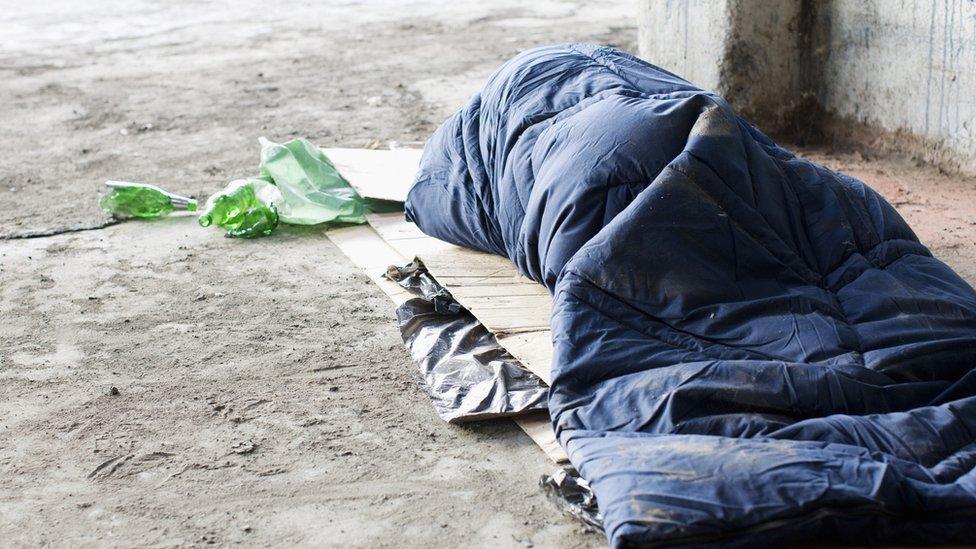Covid: Labour calls for emergency rough sleeper plan to be revived
- Published

Labour wants all rough sleepers to be helped off the streets in England this winter in a repeat of a move which it says saved lives early in the pandemic.
It says councils should get funding to revive the "Everyone In" scheme put in place during the spring lockdown.
Campaigners have said providing self-contained housing is vital to prevent the "terrifying" prospect of Covid spreading through communal shelters.
Downing Street said support for rough sleepers was being kept under review.
A No 10 spokesman said the assistance currently in place was "very extensive".
About 15,000 rough sleepers were given temporary accommodation in late March, including in empty hotel rooms and student halls, as the UK went into lockdown.
The plan, which was executed in a matter of days, was hailed by campaigners as evidence of what could be achieved through co-ordinated action between central and local government, charities and the hospitality sector.
A study in the Lancet, external, published in September, suggested the initiative - backed by £3.2m of government funding - had reduced Covid infections among rough sleepers by more than 20,000 and prevented 246 deaths.
Specific funding for the scheme stopped at the end of May but Labour say it must now urgently be revived, with the government's new stay at home order across England due to come into force on Thursday for 28 days.
Shadow Housing Secretary Thangam Debbonaire said homeless charities had reported an increase in the number of people sleeping rough in the past couple of months, many of whom were doing so for the first time.
'Safe place'
In a letter to Housing Secretary Robert Jenrick, she said ministers should act now and provide appropriate support for local authorities to provide all rough sleepers with a "safe place to call home".
"As we head into a second lockdown, the government must urgently re-start 'Everyone In', to protect rough sleepers from a cold, dangerous winter," she wrote.
"The initiative was an incredible achievement by councils and charities, which saved hundreds of lives. A repeat of this success will require strong leadership and effective co-ordination from central government."
Labour is also seeking guarantees that rough sleepers will be housed in secure, self-contained accommodation, including empty hotel rooms, and will not find themselves in "potentially unsafe" communal night shelters.
'Terrifying'
Homelessness campaigners and medical bodies have said there is a high risk of transmission of the virus in night shelters, given that social distancing and proper hygiene procedures are "likely to be all but impossible".
Crisis has said the combined effects of coronavirus and the cold weather this winter could be "terrifying" while Shelter has said councils should be instructed to provide everyone who needs it with temporary lodgings.
Councils have been given £3.2bn in extra funding to deal with the effects of the pandemic, although they say this is not enough to compensate for their loss of income and more will be needed in the upcoming Spending Review.
Ministers say they have provided £500m in funding to tackle homelessness this year, including £85m in new money in June to provide short-term housing for those in temporary accommodation and to help rough sleepers secure their own tenancies by subsiding their rental deposits.
The government has promised to provide 6,000 new homes to house the most vulnerable in society, with more than half of these due to be completed by the end of the year.
But its goal of eradicating rough sleeping by 2024 was dealt a blow last month when veteran civil servant Dame Louise Casey resigned from her post chairing the newly established Rough Sleeping Taskforce.
She subsequently told the BBC the UK risked a "period of destitution", with rising homelessness, family and child poverty, unless benefits were increased to compensate for people's loss of earnings.